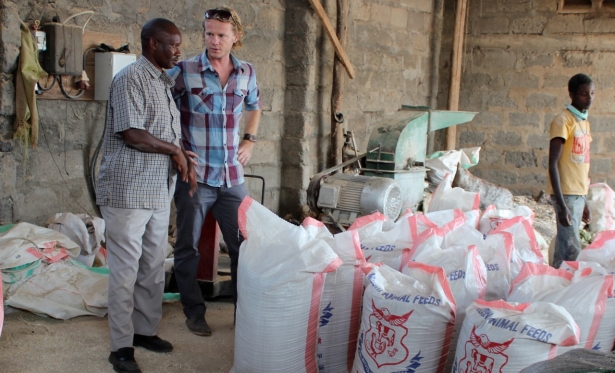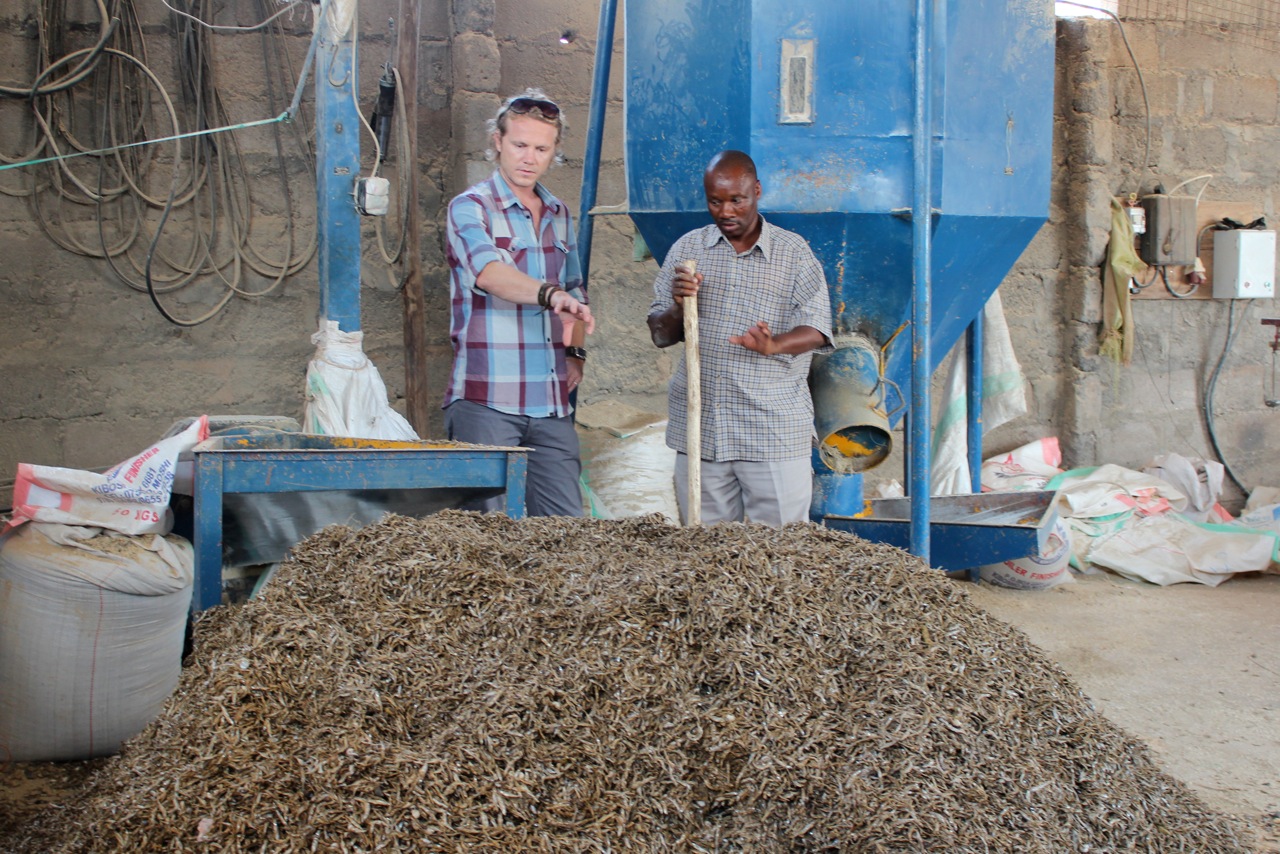Rewards beyond the bank balance | ICAA Charter (Kate Nash)31.08.2012
An article from ICAA Charter magazine describing past volunteer Blair's time in Tanzania.

Blair Jones CA is just fi nishing a three-month placement in Tanzania, assisting the finance director of Equity for Tanzania. After leaving Australia in 2005, Jones worked in London and the Caribbean before travelling through Latin America, Europe and the Middle East – a journey that would subsequently change his life. The inequality he saw compelled him to apply for a volunteer position through the UK-based organisation Accounting for International Development.
nishing a three-month placement in Tanzania, assisting the finance director of Equity for Tanzania. After leaving Australia in 2005, Jones worked in London and the Caribbean before travelling through Latin America, Europe and the Middle East – a journey that would subsequently change his life. The inequality he saw compelled him to apply for a volunteer position through the UK-based organisation Accounting for International Development.
Since its inception in 2009, AfID has placed more than 300 accountants in 26 countries across Africa, Asia and South America.
Jones, who gained his accounting qualification in Melbourne and has been a Chartered Accountant since 2004, says his decision to volunteer resulted from growing disillusionment with the world of international finance and whom it served.
“Travelling extensively in developing countries provided a stark contrast between those who controlled the money, and those who really needed it,” Jones says. “I found myself conflicted between my own requirement for a paycheque, the opportunity my profession allowed me to work around the world, and a desire to try to help those less fortunate. A cliché, but also a legitimate desire.”
His disillusionment worsened exponentially after the GFC. “The creation of AfID filled a void,” Jones says.
The great Australians
 AfID, which supports more than 150 charities and not-for-profit organisations, says Australian accountants make great volunteers. “We have had good experiences with the eight Australians who have volunteered with us, as they integrated well and adapted to new cultures easily,” AfID’s founder Neil Jennings says. “Combine this with the transferable nature of their Chartered Accountants training and they make the perfect volunteers, so we’re eager to hear from more Australians.”
AfID, which supports more than 150 charities and not-for-profit organisations, says Australian accountants make great volunteers. “We have had good experiences with the eight Australians who have volunteered with us, as they integrated well and adapted to new cultures easily,” AfID’s founder Neil Jennings says. “Combine this with the transferable nature of their Chartered Accountants training and they make the perfect volunteers, so we’re eager to hear from more Australians.”
AfID has placed Australian accountants in a school in Cambodia for three weeks; a charity that uses sport to engage and educate children in Zambia for three months; a local children’s charity in Tanzania for one month; and at Childreach Nepal for one month.
Jennings says many of the volunteer sector’s inadequacies became obvious to him in 2007 when he left the world’s largest and oldest international accounting recruitment consultancy in London to work at a small Rwandan non-government organisation, set up by orphans and refugees of the 1994 genocide to give vulnerable children access to education.
“While the staff had achieved amazing results with little or no resources, the survival of their activities hung desperately in the balance due to a lack of financial management experience and a faltering donor relationship,” Jennings says.
After Jennings returned to the UK he approached a number of volunteer organisations. Disillusioned by the common mismatching of volunteer skills by volunteer organisations, the fact that professional skills were often overlooked, and that few opportunities existed for highly-skilled, employed professionals to share their skills and experience with the organisations that needed them most, Jennings started AfID.
“With the help of several small UK charities and five adventurous accountants, pilot assignments began in Cambodia, Tanzania and Malawi. By the end of that year 22 charities were on board, and 14 assignments had been successfully completed in six developing countries,” Jennings says.
Worldwide
Volunteer placements are now offered to accountants to join a wide range of organisations around the world, ranging from tiny orphanages in African slums and climate change centres in South America to health clinics in Nepal and international non-government organisations, such as
War Child, VSO and Christian Aid.
“The types of projects we’re currently supporting include conservation, climate change, orphans, healthcare, education, microfinance, livelihoods, malaria, HIV/AIDS, community reconciliation, poverty, food security, governance and trade. Name a type of charitable project and we’re probably working on it somewhere in the world,” says Jennings.
And while most volunteers are responsible for their own travel, health, insurance and visas, they are assured a once-in-a-lifetime experience. “They experience a new culture, make friends, and come back with amazing memories,” Jennings says.
 Many volunteers also find an AfID placement contributes to their professional development.
Many volunteers also find an AfID placement contributes to their professional development.
“Management skills are generally improved, and the experience adds another dimension to CVs, which is essential for those thinking of moving to the charity/NGO sector,” Jennings says. “Our placements are invaluable for gaining the initial experience to break into what can be a closed sector. It really makes a CV stand out.”
Jennings says accountants are in a unique position to use their skills to strengthen charities around the world, sometimes saving them from closing down. “Without good financial management, charities may not be economically sustainable long term".
“Equally, strong financial management is crucial for a charity to expand its projects. Unfortunately, local staff often lack the training and expertise of qualified accountants. This can be remedied by AfID volunteers, who coach local staff and build the capacity of small charities.”
Key areas
Typical areas AfID volunteers support include organisational financial health assessment and internal audit; mentoring a new and inexperienced finance manager; book-keeping and cash management; creating and managing income and expenditure budgets; creating, monitoring and evaluating budgets; cashflow forecasting; debt and credit management and control; internal controls and financial procedures; donor reporting; restricted and unrestricted cost allocation; training on accounting systems; division of staff duties and responsibilities; external audit preparation; and confidential tutoring of non-finance staff, including members of the management committee.
Jennings gives the example of an AfID accounting volunteer who took time off from his business to work at an orphanage in Uganda. He aimed to identify and implement specific improvements in the orphanage’s accounting and reporting systems, so they could be used as examples by the staff to continue such development themselves. One example involved the radical streamlining of its cumbersome payroll system. Its operation was simplified and provided valuable information to enable more effective control of expenditure.
One auditor volunteered through AfID to work in Kenya with SMART, a charity that focuses on food security and economic empowerment. He trained the in-house financial accountant to use the new cashbook to prepare monthly bank reconciliations. He also advised what activities should be done each month and set up desk instructions for the accountant to follow. Strengthening the financial control and reporting environment has helped SMART present a stronger case for future funding, and cemented its good relations with its overseas donors.
Jones says his AfID placement has given him invaluable experience, offering him the chance to live within the cradle of humanity and witness a different side to that seen by the numerous tourists who file through the region on safari.
“The abject poverty, the smiles amid adversity, the simple pleasures in laughter over a meal with family and friends. Life distilled. I have met incredible people both locals, and those who have moved here in various capacities to try and assist in some way, no matter how large
or small,” Jones says.
“By witnessing the many problems it reaffirms how lucky I am to be Australian, with access to education, health, clean water, consistent electricity, a minimum wage, and a relatively corruption-free society. Not without faults, but where things just work.”
On completion of his placement Jones plans to travel around Tanzania – climbing Mt Kilimanjaro, going on safari though the Tarangire, Ngorongoro and Serengeti national parks, and enjoying the beaches of Zanzibar.
Jones says he will return to Australia in December to see family and friends and enjoy a long-overdue date at the MCG for the Boxing Day test.
 nishing a three-month placement in Tanzania, assisting the finance director of Equity for Tanzania. After leaving Australia in 2005, Jones worked in London and the Caribbean before travelling through Latin America, Europe and the Middle East – a journey that would subsequently change his life. The inequality he saw compelled him to apply for a volunteer position through the UK-based organisation Accounting for International Development.
nishing a three-month placement in Tanzania, assisting the finance director of Equity for Tanzania. After leaving Australia in 2005, Jones worked in London and the Caribbean before travelling through Latin America, Europe and the Middle East – a journey that would subsequently change his life. The inequality he saw compelled him to apply for a volunteer position through the UK-based organisation Accounting for International Development.Since its inception in 2009, AfID has placed more than 300 accountants in 26 countries across Africa, Asia and South America.
Jones, who gained his accounting qualification in Melbourne and has been a Chartered Accountant since 2004, says his decision to volunteer resulted from growing disillusionment with the world of international finance and whom it served.
“Travelling extensively in developing countries provided a stark contrast between those who controlled the money, and those who really needed it,” Jones says. “I found myself conflicted between my own requirement for a paycheque, the opportunity my profession allowed me to work around the world, and a desire to try to help those less fortunate. A cliché, but also a legitimate desire.”
His disillusionment worsened exponentially after the GFC. “The creation of AfID filled a void,” Jones says.
The great Australians
 AfID, which supports more than 150 charities and not-for-profit organisations, says Australian accountants make great volunteers. “We have had good experiences with the eight Australians who have volunteered with us, as they integrated well and adapted to new cultures easily,” AfID’s founder Neil Jennings says. “Combine this with the transferable nature of their Chartered Accountants training and they make the perfect volunteers, so we’re eager to hear from more Australians.”
AfID, which supports more than 150 charities and not-for-profit organisations, says Australian accountants make great volunteers. “We have had good experiences with the eight Australians who have volunteered with us, as they integrated well and adapted to new cultures easily,” AfID’s founder Neil Jennings says. “Combine this with the transferable nature of their Chartered Accountants training and they make the perfect volunteers, so we’re eager to hear from more Australians.”AfID has placed Australian accountants in a school in Cambodia for three weeks; a charity that uses sport to engage and educate children in Zambia for three months; a local children’s charity in Tanzania for one month; and at Childreach Nepal for one month.
Jennings says many of the volunteer sector’s inadequacies became obvious to him in 2007 when he left the world’s largest and oldest international accounting recruitment consultancy in London to work at a small Rwandan non-government organisation, set up by orphans and refugees of the 1994 genocide to give vulnerable children access to education.
“While the staff had achieved amazing results with little or no resources, the survival of their activities hung desperately in the balance due to a lack of financial management experience and a faltering donor relationship,” Jennings says.
After Jennings returned to the UK he approached a number of volunteer organisations. Disillusioned by the common mismatching of volunteer skills by volunteer organisations, the fact that professional skills were often overlooked, and that few opportunities existed for highly-skilled, employed professionals to share their skills and experience with the organisations that needed them most, Jennings started AfID.
“With the help of several small UK charities and five adventurous accountants, pilot assignments began in Cambodia, Tanzania and Malawi. By the end of that year 22 charities were on board, and 14 assignments had been successfully completed in six developing countries,” Jennings says.
Worldwide
Volunteer placements are now offered to accountants to join a wide range of organisations around the world, ranging from tiny orphanages in African slums and climate change centres in South America to health clinics in Nepal and international non-government organisations, such as
War Child, VSO and Christian Aid.
“The types of projects we’re currently supporting include conservation, climate change, orphans, healthcare, education, microfinance, livelihoods, malaria, HIV/AIDS, community reconciliation, poverty, food security, governance and trade. Name a type of charitable project and we’re probably working on it somewhere in the world,” says Jennings.
And while most volunteers are responsible for their own travel, health, insurance and visas, they are assured a once-in-a-lifetime experience. “They experience a new culture, make friends, and come back with amazing memories,” Jennings says.
 Many volunteers also find an AfID placement contributes to their professional development.
Many volunteers also find an AfID placement contributes to their professional development.“Management skills are generally improved, and the experience adds another dimension to CVs, which is essential for those thinking of moving to the charity/NGO sector,” Jennings says. “Our placements are invaluable for gaining the initial experience to break into what can be a closed sector. It really makes a CV stand out.”
Jennings says accountants are in a unique position to use their skills to strengthen charities around the world, sometimes saving them from closing down. “Without good financial management, charities may not be economically sustainable long term".
“Equally, strong financial management is crucial for a charity to expand its projects. Unfortunately, local staff often lack the training and expertise of qualified accountants. This can be remedied by AfID volunteers, who coach local staff and build the capacity of small charities.”
Key areas
Typical areas AfID volunteers support include organisational financial health assessment and internal audit; mentoring a new and inexperienced finance manager; book-keeping and cash management; creating and managing income and expenditure budgets; creating, monitoring and evaluating budgets; cashflow forecasting; debt and credit management and control; internal controls and financial procedures; donor reporting; restricted and unrestricted cost allocation; training on accounting systems; division of staff duties and responsibilities; external audit preparation; and confidential tutoring of non-finance staff, including members of the management committee.
Jennings gives the example of an AfID accounting volunteer who took time off from his business to work at an orphanage in Uganda. He aimed to identify and implement specific improvements in the orphanage’s accounting and reporting systems, so they could be used as examples by the staff to continue such development themselves. One example involved the radical streamlining of its cumbersome payroll system. Its operation was simplified and provided valuable information to enable more effective control of expenditure.
One auditor volunteered through AfID to work in Kenya with SMART, a charity that focuses on food security and economic empowerment. He trained the in-house financial accountant to use the new cashbook to prepare monthly bank reconciliations. He also advised what activities should be done each month and set up desk instructions for the accountant to follow. Strengthening the financial control and reporting environment has helped SMART present a stronger case for future funding, and cemented its good relations with its overseas donors.
Jones says his AfID placement has given him invaluable experience, offering him the chance to live within the cradle of humanity and witness a different side to that seen by the numerous tourists who file through the region on safari.
“The abject poverty, the smiles amid adversity, the simple pleasures in laughter over a meal with family and friends. Life distilled. I have met incredible people both locals, and those who have moved here in various capacities to try and assist in some way, no matter how large
or small,” Jones says.
“By witnessing the many problems it reaffirms how lucky I am to be Australian, with access to education, health, clean water, consistent electricity, a minimum wage, and a relatively corruption-free society. Not without faults, but where things just work.”
On completion of his placement Jones plans to travel around Tanzania – climbing Mt Kilimanjaro, going on safari though the Tarangire, Ngorongoro and Serengeti national parks, and enjoying the beaches of Zanzibar.
Jones says he will return to Australia in December to see family and friends and enjoy a long-overdue date at the MCG for the Boxing Day test.


